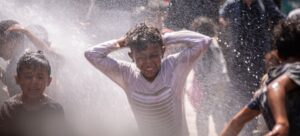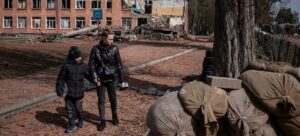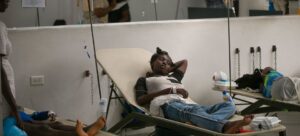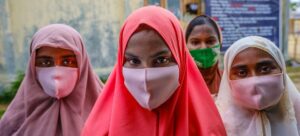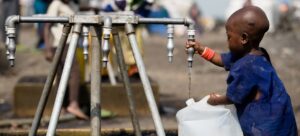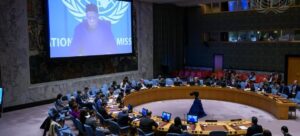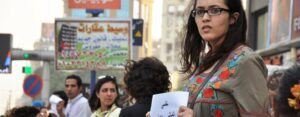The results emerging from roundtables on governance, capacity development, data and information, innovation and financing, will be shared with national representatives on Tuesday, at a preparatory meeting for the UN 2023 Water Conference, taking place in March.
Noting that the world stands at a watershed moment, the President of the General Assembly, Csaba Kőrösi, whose Office organized the consultations, told participants that it is time to “transform from reactive water management to proactive, science-based solutions to the water crisis.”
Science-based solutions
Mr. Kőrösi urged participants discuss game changers from the perspective of “solidarity, sustainability and science”, the motto of the 77th session of the General Assembly.
Former President of the Republic of Hungary, János Áder also addressed the opening, in his capacity as Member of the Water and Climate Leaders. He called for a greater emphasis on collecting and sharing information: “We cannot stop this water crisis. We have to adapt. And to adapt, we need data and information.”
Shaken, not stirred
Reminding participants of the “James Bond ratio” whereby only 0.007 per cent of the planet’s water is potable. Mr. Áder listed categories missing data bases, such as on water quality, grid loss, humidity content and wastewater.
Without good date on these topics, it makes it difficult to see the potential social, political and economic impact of water issues, Mr. Áder noted.
The opening session also heard from UN Global Compact Chief of Staff, Melissa Powell. She discussed CEO Water Mandate, which is an initiative to align business principles with water, sanitation and the Sustainable Development Goals (SDGs) – and called for greater engagement with the public sector.
Speaking also on behalf of the private sector in the opening, Matthias Berninger, who works in Public Affairs and Sustainability at Bayer, said more and more companies are engaging on water because it is important for their businesses.
Scientists, representatives of the private sector and civil society today met at the United Nations in New York to discuss game changers related to water and sustainability.
Fluid new systems
He suggested that now is the time to start a more concerted effort to create a water and climate information system which would allow assistance for farmers, people living on shorelines, and decisionmakers.
Youth advocate, Keziah Theresee Gerosana, called for UN agencies to allocate at least half of their budgets to water and climate projects.
Referring to the importance of intergenerational discussions, in addition to inter-sectoral, she urged participants to see young people as allies: “Will you open your doors and accept us? Allow us to be your partners for change?”
Young business leader Lindsey Blodgett, called on participants to “work together outside of our spheres of influence” to harmonizing game changers across communities that normally would not be cooperating.
Short on climate action
Joining by video message, the Secretary-General of the World Meteorological Organization Petteri Taalas warned that climate action failure – which includes water inaction – is the biggest global risk.
He stressed the need to invest more in early warning systems, and to fill in the gaps in meteorological observing systems on the African continent, among Small Island Developing States (SIDS) and the Least Developed Countries (LDCs).
Monday’s discussions also included information from a series of online stakeholder discussions organized earlier this year by the UN Department of Economic and Social Affairs (UN DESA).
That Department’s Under-Secretary-General Li Junhua, who is the Secretary-General of the UN 2023 Water conference, presented the findings. UN DESA helped to organize today’s discussions.
Governance overhaul
Revolutions hurt, said Hank Ovink, Special Envoy for Water from the Netherlands, addressing the roundtable on governance. Netherlands, along with Tajikistan, are the co-hosts of UN 2023 Water Conference.
Mr. Ovink said that to really have an impact, the international community will need to change “quite a log about what we’re used to, in combination with political will, societal will, a whole of society approach in a radically inclusive way.”
The Special Envoy told participants and moderator Danielle Gaillard-Picher, the Global Coordinator of the Global Water Partnership, that the contributions and societal will of everyone watching can make a difference.
Developing capacity
One of the issues discussed in the roundtable on capacity development is the establishment of a mechanism like the Intergovernmental Panel on Climate Change or IPCC, which could provide policy makers with science-based knowledge.
“That knowledge has to be translated to change water culture,” said Moderator Abou Amani, the Director of Water Sciences Division at UNESCO. “Because too many people are taking water for granted.”
Topics also discussed in the roundtable included not leaving anyone behind, as well as formal and informal water education and financing to help support the movement.
Need to know
Carolina Tornesi MacKinnon, of the World Youth Parliament for Water, moderated the panel on data and information.
One of the game changers discussed was the UN Early Warnings for All initiative, which is expected to be discussed at the COP27 in Egypt next month.
Participants also discussed the need for databases and better information on water use and water quality, that are open to all, without proprietary use or high subscription prices.
Some also mentioned the importance of gender, referring to the UNICEF statistic that women and girls spend 200 million hours a day gathering water, which allows them far less time than they need for studies and income generating activities.
Children stand in a flood water in Borno State, Nigeria.
Innovation
Among the game changers discussed in the innovation roundtable moderated by Marc Zeitoun, from the Geneva Water Hub, participants discussed topics such as appointing water champions within parliaments, to connect decision makers with the issue.
Some participants highlighted unconventional water resources, noting that in some countries, water reuse cannot be part of the solution because there is no water to reuse. Such technologies also include desalinating systems, and methods of extracting water from air.
Accessing finance
In the roundtable on financing, moderated by the economic development body OECD’s Anna Dupont, one of the topics discussed was the importance of linking water to the resilience and climate change agenda.
Close to 80 per cent of natural disasters so far this century are water-related.
Participants also discussed financial implications and how to drive investment, given rising interest across the private sector in water-related, sustainability issues. The interest is being driven in part by the need to access resources on the part of business.
Happening now!
Stakeholder consultations for the Preparatory Meeting of the #UN2023WaterConference.
Follow along #WaterAction ⬇️
🎥 Roundtable 1️⃣ on Governance: https://t.co/hLgUn8hvb5
🎥 Roundtable 2️⃣ on Capacity Development: https://t.co/YFMels3W5J https://t.co/QaYzA43Vym
On Monday, we begin consultations with civil society, private sector & scientific community on ‘game changers’ for #WaterAction & sustainability issues.
Our hope is to inspire people to work together ahead of the #UN2023WaterConference & beyond.
Join us: https://t.co/eS8grmlDt4 https://t.co/hCUekFM5Ss


